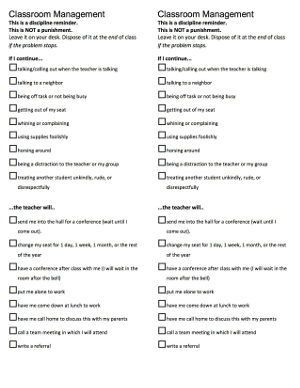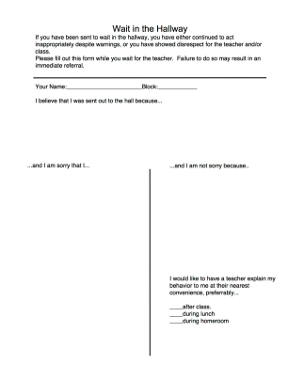2 Surprisingly Useful Classroom Management Handouts
I ran across a couple of useful classroom management handouts that I thought might be helpful. I can't claim credit for either of them. The handouts were created by rain-dog2, and you can find the original discussions around them on Reddit here and here. They're offered here as inspiration for your own classroom.

The first handout provides an easy way to address misbehaviors without disturbing the rest of the class. The folowing is rain-dog2 description:
Firstly, this is NOT meant as a punishment. It's a respectful reminder. I don't use it with anger.
If a student is doing anything wrong, I give them the nonverbal warning. If it happens again, I pull out one of these slips and I check two boxes: Their behavior and the consequence.
90% of the time that's it. There's no punishment or documentation. But if the behavior continues, I just pick up the paper and do what I said I would do. I write their name and the date on the paper and now I have my documentation of the problem.
Here's why I think this works so well:
- The kid doesn't get publicly shamed, and they feel respected for that. Students who are paying attention see that I'm filling out the paper, but they don't know anything else.
- I don't have to stop class to take care of it.
- It's a visual reminder right there in front of them of what is clearly going to happen. No bluffing. No nagging. Just fact.
- I don't lose my patience and administer disproportionate consequences.
The second handout is for when students are sent out into the hallway. Here is rain-dog2 again with a description:
I train my kids so that if they're ever sent to the hallway, they grab a clipboard and pen by the doorway. The clipboard has a stack of these papers. Their job is to fill it out. The key idea is that they have something to do while they wait, and they know that if they don't fill it out they go right to the office.

It's great because I don't have to stop the class to tell the kid what they did. Odds are, they already know. By the time I get out there, their apology is already written. They've calmed down, and so have I. They also haven't been practicing their speech for me. Either you know you were wrong or you don't. Having it written down also helps me to get to the heart of the matter faster.
The key philosophy behind this is that I'm trying to figure out if I can get the kid back on the same page with me, or if they're just done. This form has done a lot to help repair relationships with my most troublesome students.
If either of these handouts are helpful, then feel free to head over to the original discussions and send rain-dog2 some love.